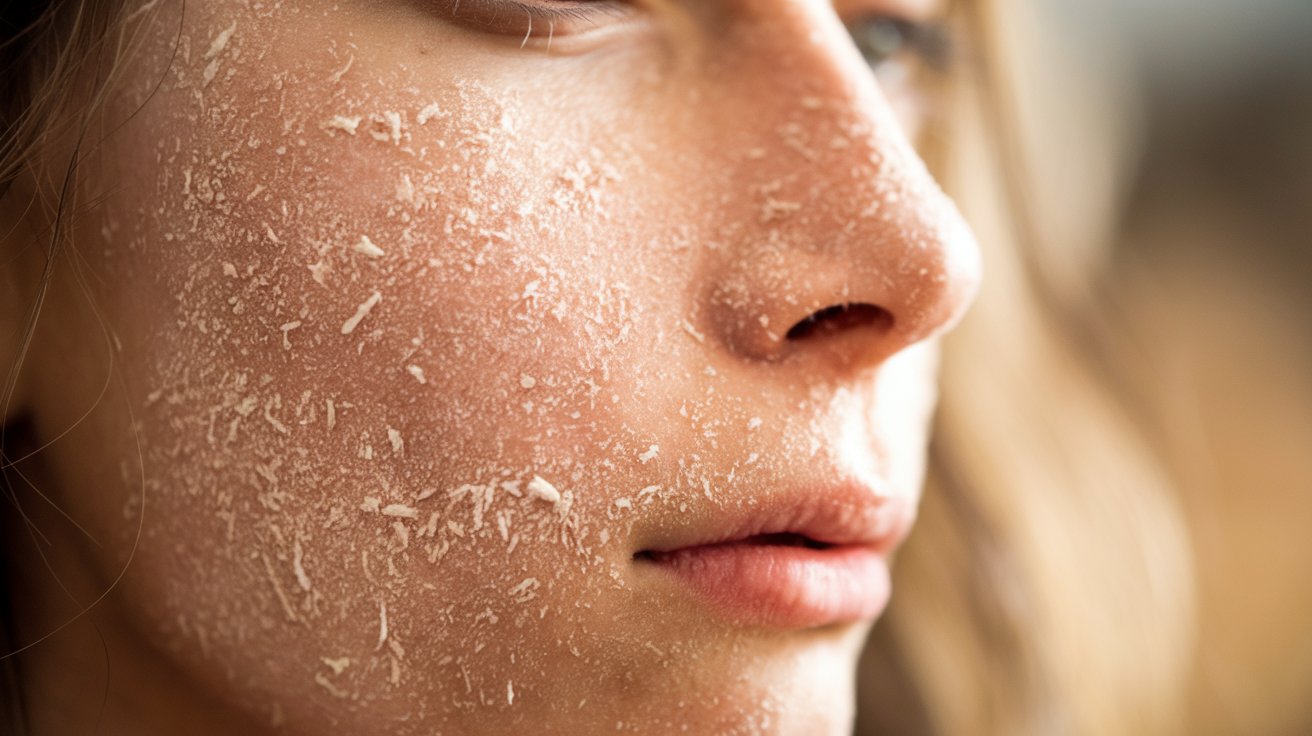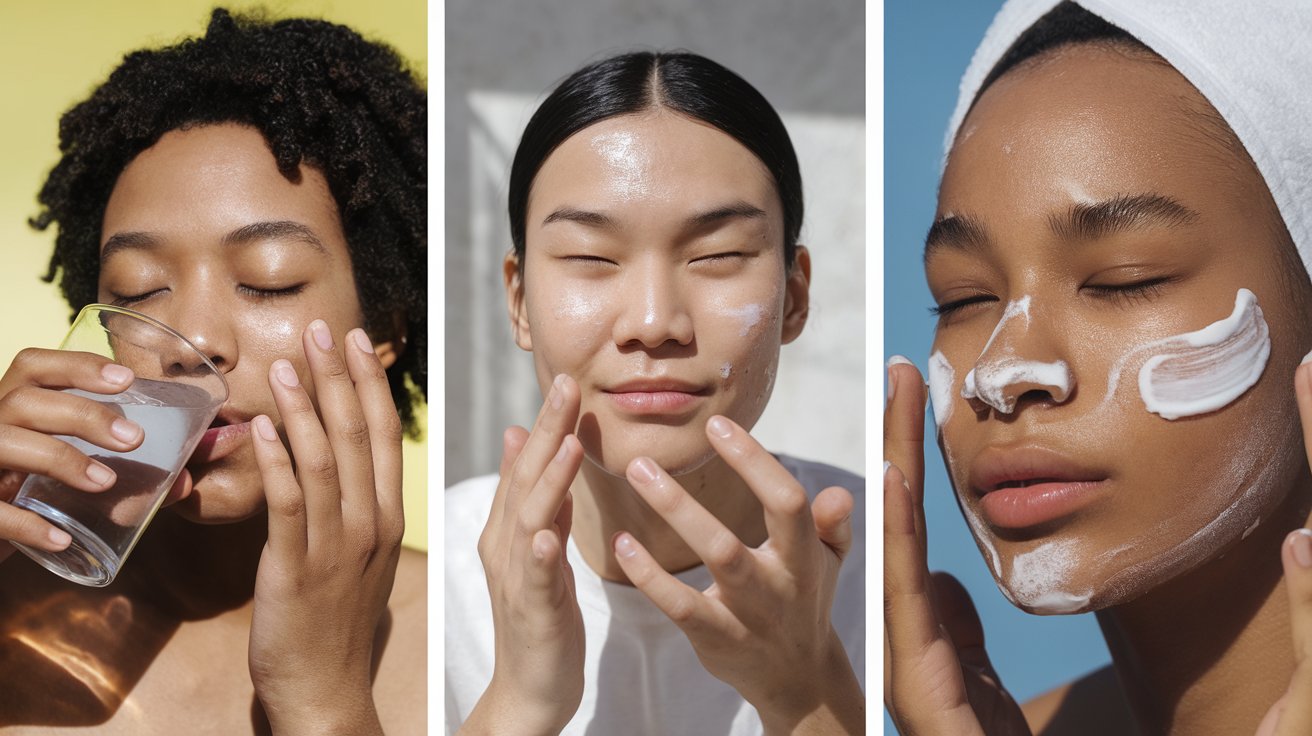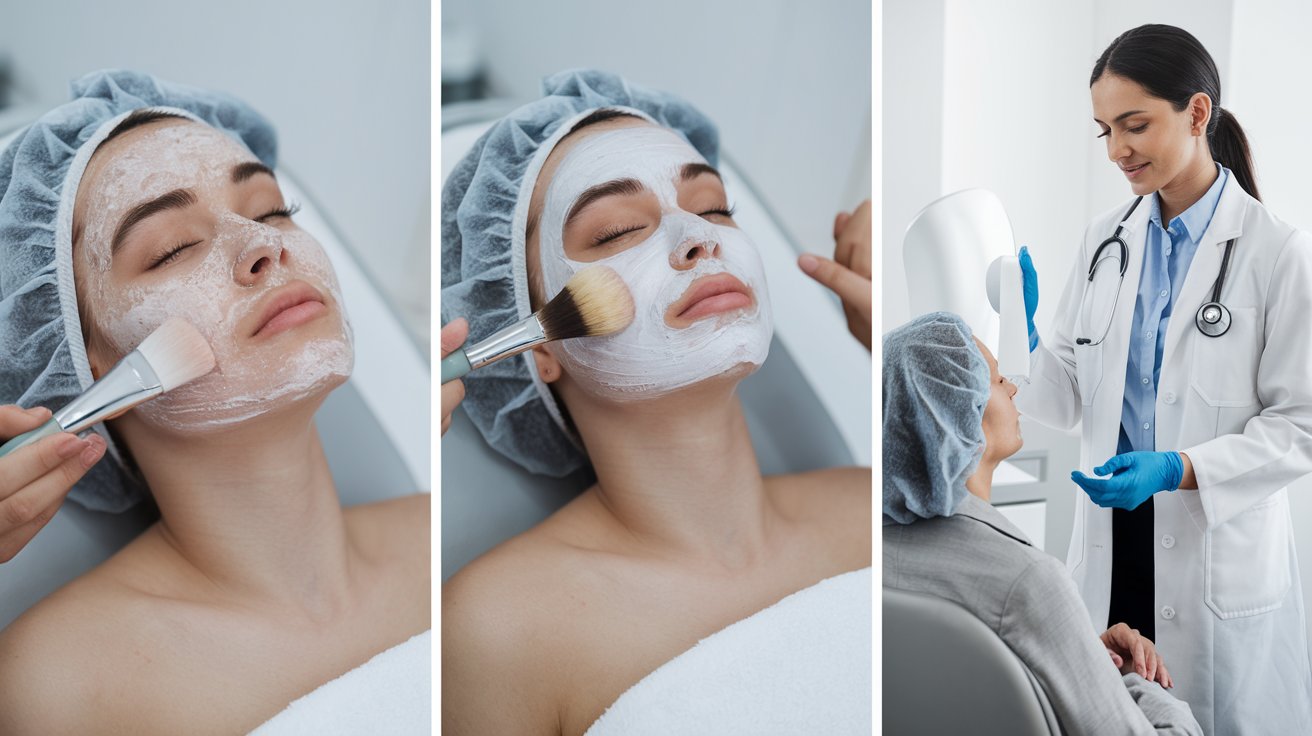Dry and flaky skin is one condition that is quite irritating and may cause a lot of discomfort. It can leave your skin feeling rough, itchy, and dull. Flaky skin on the face is a common issue that can affect anyone, regardless of age or skin type. But don’t worry, with a few simple changes to your skincare routine, you can achieve a healthy, hydrated complexion.
UNDERSTANDING FLAKY SKIN

Flaky skin occurs when the outer layer of the skin loses moisture and becomes dry, leading to the shedding of dead skin cells. This can be caused due to several factors:
-Environmental factors: Cold weather, low humidity and exposure to harsh winds can strip moisture from the skin.
-Product use: Harsh soaps, alcohol-based toners, and heavily fragranced products can irritate the skin and disrupt its natural barrier.
-Skin conditions: Conditions like eczema, psoriasis, and dermatitis can lead to chronic dryness and flaking.
-Lifestyle choices: Poor hydration, excessive sun exposure, and inadequate skincare routines can worsen dry skin.
TIPS FOR PREVENTION

1. Choose Gentle Cleansers
Use a mild, non-comedogenic cleanser which is essential for maintaining skin hydration, and avoid the use of hot water. Avoid products with sulfates or alcohol, which can strip your skin of its natural oils. Instead, opt for cream-based or soap-free cleansers that hydrate while cleansing.
A gentle cleanser that is highly recommended for this purpose is the Cetaphil Gentle Skin Cleanser which is perfectly suitable for dry, sensitive skin.
2. Limit Bathing Time
Long, Hot showers may feel relaxing but they can dehydrate your skin. Limit your bathing time to 5-10 minutes and use lukewarm water instead of hot. This helps retain the skin’s natural oils.
3. Moisturise Immediately and Regularly
Apply a thick moisturizer, suitable for your skin type, immediately after bathing or washing your face. This practice helps to lock in moisture. Look for products containing ingredients like hyaluronic acid, glycerin, and ceramides, which are effective at retaining hydration and excellent for keeping your skin plump and healthy. Also remember, that the best time to moisturize is when your skin is still slightly damp.
You can use the Olay Regenerist Retinol 24 Night Moisturiser, with the goodness of retinol and hyaluronic acid, for this purpose.
4. Use a Humidifier
During the dry season or winter months, consider using a humidifier in your home. A humidifier adds moisture to the air and helps maintain moisture levels. This can prevent your skin from becoming dry and flaky.
5. Avoid Harsh Products
Be aware and careful with the products you use on your skin. Steer clear of products containing fragrances, alcohol, or other irritating ingredients. Instead, choose fragrance-free and dermatologist-recommended products to minimize the risk of irritation.
You can read further about this on Skincare Ingredients to avoid if you have Sensitive Skin.
6. Stay Hydrated
Do not forget about hydration from within. Drinking plenty of water is vital for maintaining skin hydration. Aim for at least 8 glasses of water a day, and consider incorporating hydrating foods like fruits and vegetables into your diet, for eg. cucumbers and oranges.
7. Protect Your Skin from the Sun
Sun exposure can dry out your skin, leading to flakiness. Always apply a broad-spectrum sunscreen lotion with at least SPF 30 for sun protection, even on cloudy days.
Use Dot&Key Blueberry Hydrate Barrier Repair Sunscreen Spf 50+ which is specifically designed for dry and sensitive skin and helps hydrate and repair the skin’s barrier.
8. Dress appropriately for the Weather
In cold or windy weather conditions, shield your face with a scarf or hat for protection. This barrier can help protect your skin from the elements and prevent moisture loss.
9. Manage Stress
Stress can negatively impact skin health. It can trigger the release of cortisol, a hormone that can disrupt the skin’s balance and lead to inflammation. Practice stress-reducing techniques such as yoga, meditation, or deep breathing to help with stress management.
TIPS FOR TREATMENT

1. Exfoliate Gently
Exfoliating helps remove dead skin cells that can lead to flakiness. However, it's essential to be gentle. Use a soft microfiber cloth or a mild exfoliating product, such as the St. Ives Face Scrub, once or twice a week to avoid further irritation.
2. Consider a Face Mask
Hydrating face masks provide intense moisture care to your skin. They often contain ingredients like hyaluronic acid, aloe vera, and shea butter, which can deeply penetrate the skin and lock in hydration, helping soothe and nourish flaky skin. Using a hydrating face mask once or twice a week can help improve skin texture and reduce flakiness.
The Dot & Key Reviving Clay mask, enriched with hyaluronic acid and vitamin C, is well-recommended for this purpose.
3. Consult a Dermatologist
If you find that your skin remains flaky despite following these tips, it may be time to consult a dermatologist. They can help identify any underlying conditions and recommend tailored treatments.
CONCLUSION
Flaky skin on your face does not have to be a permanent issue. By implementing these strategies and being mindful of your skincare routine, you can maintain a smooth, hydrated, and glowy complexion. Remember, the key is consistency and choosing the right products for your skin. With just a little care and attention, you can say goodbye to dry flaky skin forever.
